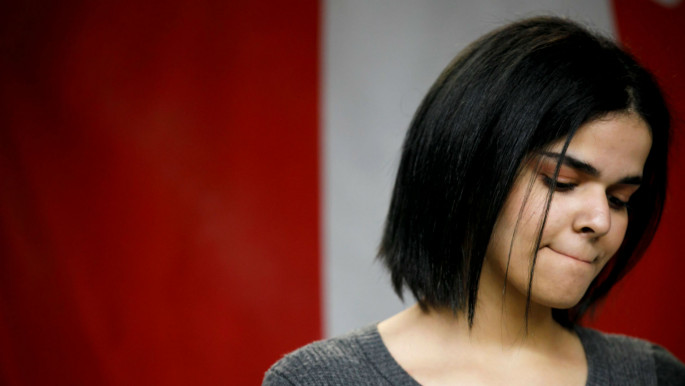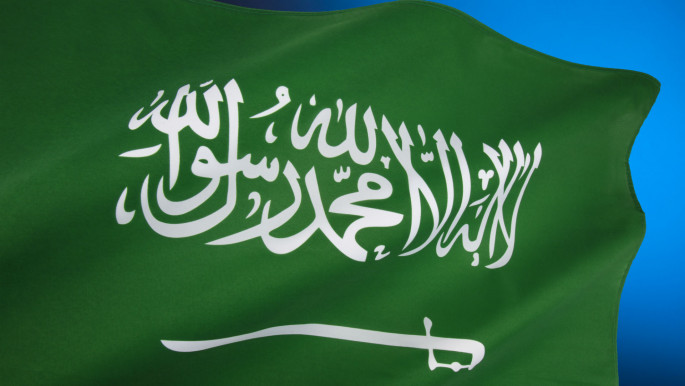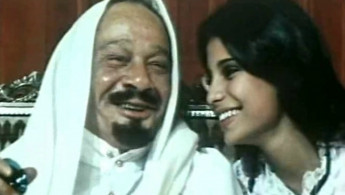'Death of a Princess': Adultery and execution in Saudi Arabia
With the story Saudi runaway Rahaf al-Qunun recently making headlines, it has been a stark reminder that the issues raised in the documentary-drama Death of a Princess remain relevant today.
Princess Mishael's execution is said to have led to the establishment of Saudi Arabia's strict guardianship rules, which forbids Saudi women from leaving the country without the permission of a male guardian.
The fall-out over the execution of Princess Mishael covered by this documentary resulted in the threat of economic sanctions by Riyadh and the expulsion of the British ambassador from Saudi Arabia.
The New Arab interviewed Anthony Thomas, the English documentary filmmaker, director and author, whose interviews formed the basis of this movie, to better understand what had happened then and to gain his perspective on what has changed since.
Anthony Thomas: She was a palace princess – like a lot of them – and led an empty life watching videos or reading magazines. There were days sometimes didn't start until five in the afternoon.
She obviously had a very strong personality and took considerable risks, but palace life was as described by Rosemarie Buschow – who was working out there as a nanny for the baby cousin of Mishael – as an idle place where a lot of time was wasted. It wasn't a very inspiring environment.
There are multiple versions of this story, all very, very different. What makes you sure that your version is the true account?
I am absolutely sure, picking our way through all these very different versions, I am absolutely sure that she wasn't tried in an Islamic court. I am certain that the reason she was executed in a sort of waste ground in front of the hotel, where the English carpenter was living, and not in a normal place where executions took place, is that her grandfather insisted on this punishment and it didn't take place in the same location as other executions do in Saudi Arabia in Jeddah.
 |
|
| Read also: Saudi Arabia: 10 Reasons Why Women Flee |
"Whether they were Palestinians, whether they were conservative Saudis, whether they were radicals, they attached themselves to this princess": These are your words. How do you really define this attachment to the princess in a society that ultimately supports punishment of adultery by execution based on religious and cultural beliefs?
Palestinians saw her as a freedom fighter and one woman I spoke to completely identified with her. All of these people have different views which expressed many of the different positions for women in the Arab world.
Have you met anyone who supported the execution?
Yes, the nanny Rosemarie. She believed that there was a trial and that she was rightly executed for committing adultery.
You said: "She was just executed in a car park." Why would they kill her secretly if their intention was to show the Saudi people that they will be strict [on adultery], even with their own daughters?
No, it wasn't a secret execution, it took place in a very public place. It was a piece of waste ground which had a few cars parked in it and there were huge crowds that came to see it. It wasn't done in a private place it was done very very openly.
What about the story that her family paid money to one of the tribes to give one of their daughters to be executed instead of the princess?
No that's rubbish. In the film we listen to all these different versions, one person who says that the English man who took the photograph was working for the CIA and another person made this foolish claim about taking the daughter. That's the sort of rubbish that was going on, but as the film moved forward we got to the true version and the film certainly doesn't suggest that a Bedu [bedouin] woman was substituted for her. That's nonsense. And it appears in the film to be nonsense.
In one of the scenes, the actor who is a doctor at a London university, said: "To survive as an Arab you need to have schizophrenia." Based on your own experiences of the Arab world what is the true meaning of this statement for you? And after the period of time you have lived in the Arab world, how true do you think this statement is today?
I don't know about schizophrenia but I do believe what he said in that context meant that you have to live in two different worlds at once. This man was, in reality, a very eminent diplomat and I won't give his name away because I know he still alive. But he said to be an Arab you have to live in two different worlds at once and he uses the example of the family which is a very, very important unit in Arab culture. Quite often you have hundreds of years of difference between the child and his father.
The case of the man I am talking about said that his father never travelled more than 10 miles on his donkey and yet I am here, in a senior position at an Arab embassy. I thought he is very good because he said that he understands Mishael and he understands her family because of that huge diversion between two successive generations. And he also said that his own brother couldn't continue his relationship with his father because he felt so distant.
Now, I don't know if this statement is still true today, I am talking about the late 70s, as I haven't done an intensive research there recently.
 |
|
| Read also: Saudi runaway says more women will flee 'abusive' kingdom |
In the movie you talked about the princesses' secret sex lives. Do you think this is a fair reflection or stereotype of all their princesses at that time? Do you think the statement is relevant in Saudi today?
I don't know if it is relevant in Saudi today but I am very certain it was relevant at the time when I was making that film.
"And I have great affection for the Arab world." You said this in one of your interviews in 2005. What is it that you liked about the Arab world and how much of it did you find difficult to understand?
What I love most about the Arab world is the warmth of the people, the friendship, the intensity of a friendships and it is an environment where I feel very very comfortable and I have made dear friends. I don't have friends in Saudi Arabia but I certainly do have in Egypt, and Lebanon, and I really enjoyed my time in these places.
I find difficult to understand the tragedy of civil war in Lebanon, it is terrible. I made a trilogy of films in the Arab world in 1974 and it was a time of great hope there and the Egyptian people were very optimistic about the future. Now, you know, the present regime is becoming more and more of a dictatorship. I feel their tragedy very much, indeed, they don't deserve this.
How do you think Saudi and Arab societies have changed, between then and now?
Well, in 2011 we thought that there was going to be a whole new movement an "Arab Spring" and every single aspiration has been disappointed.
Saudi Arabia has changed since I was there and there is a much higher percentage of women in education. We know that women can drive but it still has got a very, very long way to go.
What is the central message that you wanted to convey through this movie?
Well, I began with a message that really converted an act of barbarism into the most moving confrontation between the king and his grand-niece. It turned out into a very different kind of film to the one I anticipated I would make, but I do feel that it gave one an opportunity to look at the complexity.
You know, that to be in Beirut at the time of war searching for the truth about a princess, there were so many things in that film that sort of told us more about the present conditions in the Arab world and delivered a completely different message from the one I had originally intended to give.
But this is the thing about documentary-making, you must be guided by the facts rather than go in with a preconception. Too many documentaries today are made like that, going in to make these points.
No, go there, and absorb, and be willing to change anything in order to follow the truth.
Would you produce the film in a different way today and if so, why?
No I wouldn't do it in any different way at all.
Did you expect such an angry reaction from Saudi society to the movie?
No, I didn't because when I showed it in Egypt to the people there, who had given me the permission to film, I asked the deputy minister whether he was concerned about the Arab worlds' reaction and he said to me the Saudis are too sophisticated to publicise your film by making a row about it. It is interesting that when it was repeated in 2005 in the United States, the Saudis didn't make a word and, of course, the viewing figures were nothing like they were in 1980.
Katia Youssef is a journalist for al-Araby al-Jadeed.
Follow her on Twitter: @KatiaYoussef




